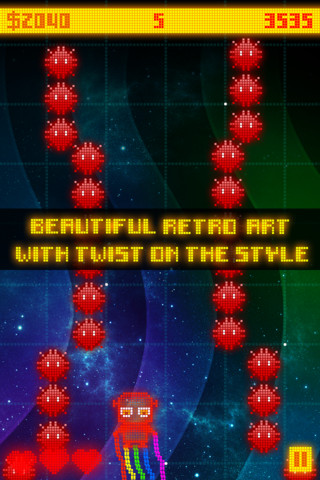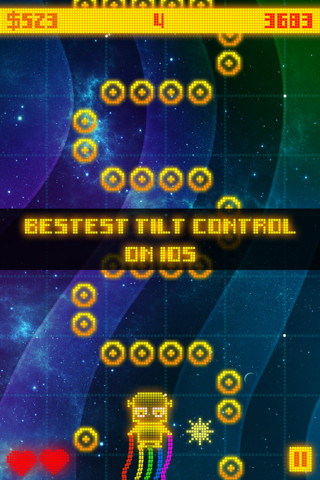 At first glance, Sad Robot [Free] doesn’t seem to offer anything that hasn’t already been done on iOS. This is simple obstacle-avoidance arcade game that offers pseudo cave-flyer gameplay. Similarly, the retro-inspired graphics have been seen countless times during the resurgence of retro in the iOS games universe. But while Sad Robot’s components are not unique, they’re executed well and form a cohesive whole that has some equally good core action to offer.
At first glance, Sad Robot [Free] doesn’t seem to offer anything that hasn’t already been done on iOS. This is simple obstacle-avoidance arcade game that offers pseudo cave-flyer gameplay. Similarly, the retro-inspired graphics have been seen countless times during the resurgence of retro in the iOS games universe. But while Sad Robot’s components are not unique, they’re executed well and form a cohesive whole that has some equally good core action to offer.
In the game you control a humanoid as he goes from galaxy to galaxy dodging obstacles while collecting coins and power-ups. Mechanically, Sad Robot plays like most other vertical cave-flyers, with the difficulty always starting slow and ramping up the longer you stay alive. There really isn’t much else to the core experience, although the game does manage to pace itself in such a way that each run doesn’t appear to be too easy or hard. However, Sad Robot is probably not for gamers looking for substantial depth.
Sad Robot manages to supplement its simple core gameplay with a few elements to extend its shelf life. In addition to the standard high score leaderboard, it has both an experience system as well as a coin/inventory system. The experience system doesn’t appear to have any affect the gameplay and is used mainly as a self-progression tool. The coin collection, however, is a bit more substantive. In addition to using coins to purchase additional robots, each with different attributes, you can also use coins to purchase and upgrade power-ups.
Oh, and while the upgrades don’t substantially change the gameplay, they do offer enough of an advantage to keep you coming back to collect coins. There’s an option to purchase additional coins in-game, but it’s certainly not necessary as you can quickly collect lots of coins with a few playthroughs.
Like most other games in its genre, Sad Robot relies heavily on the precision of its controls and it offers both tilt-based and touch options. While the game defaults to the tilt controls, I found the touch-based controls to much more manageable (once you take a few minutes to get acquainted with the quirks). My preference was mainly based on the lack of calibration with the tilt controls, which made it hard for me to find my sweet spot controlling. However, I’ve also heard reports of the tilt controls being manageable without calibration, so it may just be my experience. Creator Colorbox has stated that an update fixing the controls is in the works, so this issue may be settled soon. Regardless, Sad Robot’s control scheme does work in its current incarnation, which is important part of its gameplay.
I feel compelled to give a special mention to the music, which I thought was amazing. There is only one song, Pornophonique’s Sad Robot. While not composed for this game, the song is surprisingly appropriate (and, based on developer comments, a chief inspiration while creating the game). Since there’s only one song, and it starts over again with each new game, monotony can become a problem after playing the game many times. However, I personally never got tired of it, as the song continued to enhance my experience every single time. This is one of those elements that really makes or breaks the overall presentation of a title, and I think Sad Robot succeeds from a music standpoint.
As mentioned earlier, Sad Robot is truly an example of the sum of its parts being greater than each element taken separately. Both the graphics and music do a great job in enhancing the experience of what is otherwise a simple game. Everything just flows well in a sort of existential way, which is a feeling I do not get often while playing games. If you have any interest in arcade games with retro graphics, Sad Robot is definitely worth a download, even more so since it’s currently being offered for free.


